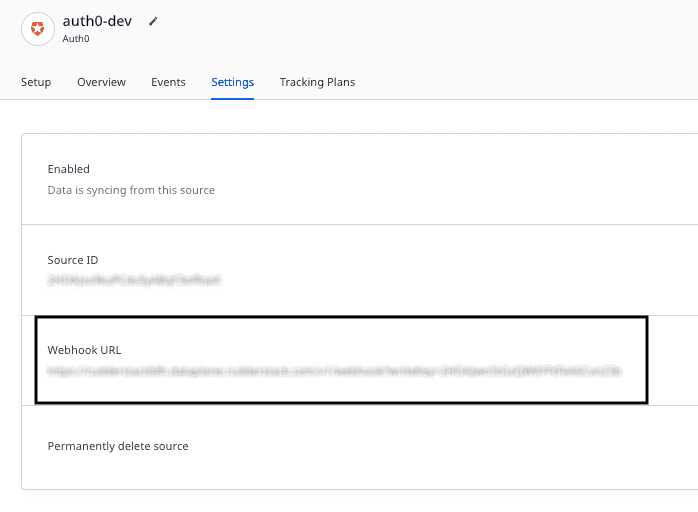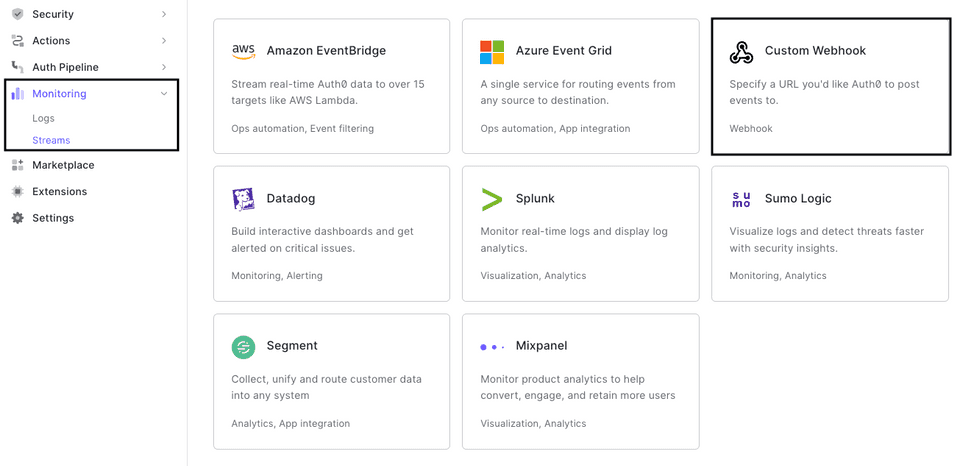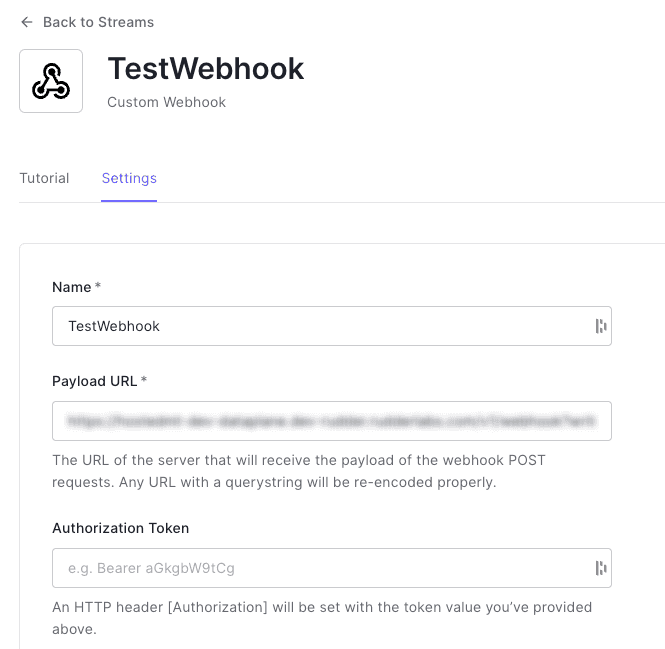Auth0 is a popular solution used by many companies to add authentication and authorization services to their applications. You can send your Auth0 authentication and user behavior-related events by adding a custom webhook that points to RudderStack.
This guide will help you set up Auth0 as a source in RudderStack.
Getting started
Follow these steps to set up your Auth0 source in the RudderStack dashboard:
- Go to your RudderStack dashboard and click Add Source. From the list of Event Streams sources, select Auth0.
- Assign a name to your source and click Continue.
- Your Auth0 source is now configured. Note the Webhook URL in the Settings tab, as shown:

- Next, log into your Auth0 dashboard.
- Go to Monitoring > Streams > Create Log Stream > Custom Webhook, as shown:

- Name your custom webhook. In the Payload URL field, enter the webhook URL obtained in Step 3.

- Configure the other webhook settings as required.
- Click Save to save the custom webhook.
Event transformation
RudderStack ingests the Auth0 events as identify, track, and group events.
- RudderStack converts the Auth0 payload into an
identifyevent if the Auth0 payload contains the eventtypeasss.
The sample payload from Auth0 containing the event type as ss:
{ "log_id": "90020221031055712103169676686005480714681762668315934738", "data": { "date": "2022-10-31T05:57:06.859Z", "type": "ss", "description": "", "connection": "Username-Password-Authentication", "connection_id": "con_djwCjiwyID0vZy1S", "client_id": "vQcJNDTxsM1W72eHFonRJdzyOvawlwIt", "client_name": "All Applications", "ip": "35.166.202.113", "user_agent": "unknown", "user_id": "auth0|*****", "user_name": "alex@example.com", "strategy": "auth0", "strategy_type": "database", "log_id": "90020221031055712103169676686005480714681762668315934738" }}The sample payload after RudderStack transforms it into an identify event:
{ "context": { "integration": { "name": "Auth0" }, "library": { "name": "unknown", "version": "unknown" }, "request_ip": "35.166.202.113", "traits": { "userId": "auth0|*****", "user_name": "alex@example.com" }, "userAgent": "unknown" }, "integrations": { "Auth0": false }, "messageId": "782d2e9b-4143-4798-b9dc-8cc55e4deed9", "originalTimestamp": "2022-10-31T05:57:06.859Z", "properties": { "client_id": "vQcJNDTxsM1W72eHFonRJdzyOvawlwIt", "client_name": "All Applications", "description": "", "log_id": "90020221031055712103169676686005480714681762668315934738" }, "rudderId": "d3cedaf9-dc50-4602-8ff2-85026d348f69", "sentAt": "2022-10-31T05:57:06.859Z", "traits": { "connection": "Username-Password-Authentication", "connection_id": "con_djwCjiwyID0vZy1S" }, "type": "identify", "userId": "auth0|*****"}- RudderStack converts the Auth0 payload into a
groupevent if the Auth0 payload contains thedescriptionasAdd members to an organization.
The sample payload from Auth0 containing the event description as Add members to an organization:
{ "log_id": "90020221031061004280169676882609459981150114445973782546", "data": { "date": "2022-10-31T06:09:59.135Z", "type": "sapi", "description": "Add members to an organization", "client_id": "vQcJNDTxsM1W72eHFonRJdzyOvawlwIt", "client_name": "", "ip": "35.167.74.121", "user_agent": "Mozilla/5.0 (Macintosh; Intel Mac OS X 10_15_7) AppleWebKit/537.36 (KHTML, like Gecko) Chrome/105.0.0.0 Safari/537.36", "details": { "request": { "path": "/api/v2/organizations/org_eoe8p2atZ7furBxg/members" } }, "user_id": "google-oauth2|123456", "log_id": "90020221031061004280169676882609459981150114445973782546" }}The sample payload after RudderStack transforms it into a group event:
{ "context": { "integration": { "name": "Auth0" }, "library": { "name": "unknown", "version": "unknown" }, "request_ip": "35.167.74.121", "traits": { "userId": "google-oauth2|123456" }, "userAgent": "Mozilla/5.0 (Macintosh; Intel Mac OS X 10_15_7) AppleWebKit/537.36 (KHTML, like Gecko) Chrome/105.0.0.0 Safari/537.36" }, "groupId": "org_eoe8p2atZ7furBxg", "integrations": { "Auth0": false }, "messageId": "1bc7876a-7c9d-4c0a-a1a9-179b804135f5", "originalTimestamp": "2022-10-31T06:09:59.135Z", "properties": { "client_id": "vQcJNDTxsM1W72eHFonRJdzyOvawlwIt", "client_name": "", "description": "Add members to an organization", "details": { "request": { "path": "/api/v2/organizations/org_eoe8p2atZ7furBxg/members" } }, "log_id": "90020221031061004280169676882609459981150114445973782546" }, "rudderId": "414ca53a-7f7e-4ec8-8d62-3c5cfcf15f91", "sentAt": "2022-10-31T06:09:59.135Z", "type": "group", "userId": "google-oauth2|123456"}- RudderStack converts the rest of the events as
trackevents.
The sample payload from Auth0:
{ "log_id": "90020221031061530247169676961198100736838335677367058450", "data": { "date": "2022-10-31T06:15:25.196Z", "type": "gd_tenant_update", "description": "Guardian - Updates tenant settings", "ip": "35.160.3.103", "user_id": "google-oauth2|123456", "log_id": "90020221031061530247169676961198100736838335677367058450" }}The sample payload after RudderStack transforms it into a track event:
{ "context": { "integration": { "name": "Auth0" }, "library": { "name": "unknown", "version": "unknown" }, "request_ip": "35.160.3.103", "traits": { "userId": "google-oauth2|123456" } }, "event": "Guardian tenant update", "integrations": { "Auth0": false }, "messageId": "b7e0134b-3cc9-418d-803c-1fb72139f572", "originalTimestamp": "2022-10-31T06:15:25.196Z", "properties": { "description": "Guardian - Updates tenant settings", "log_id": "90020221031061530247169676961198100736838335677367058450" }, "rudderId": "414ca53a-7f7e-4ec8-8d62-3c5cfcf15f91", "sentAt": "2022-10-31T06:15:25.196Z", "type": "track", "userId": "google-oauth2|123456"}RudderStack maps the following properties from Auth0 event payload to the RudderStack properties for all the identify, track, and group events:
| Auth0 Property | RudderStack Property |
|---|---|
auth0_client | properties.auth0_client |
client_id | properties.client_id |
client_name | properties.client_name |
connection | traits.connection |
connection_id | traits.connection_id |
description | properties.description |
details | properties.details |
details.auth.user.email | context.traits.email |
details.auth.user.name | context.traits.name |
log_id | properties.log_id |
isMobile | properties.is_mobile |
ip | context.request_ip |
user_name | context.traits.user_name |
user_agent | context.userAgent |
user_id | userId context.traits.userId |
Debugging
If you are unable to see any events flowing from the Auth0 API webhooks to RudderStack, you can troubleshoot the issue by viewing the API webhooks logs. To do so, go to your Auth0 dashboard and navigate to Monitoring > Logs.
Contact us
For more information on the topics covered on this page, email us or start a conversation in our Slack community.